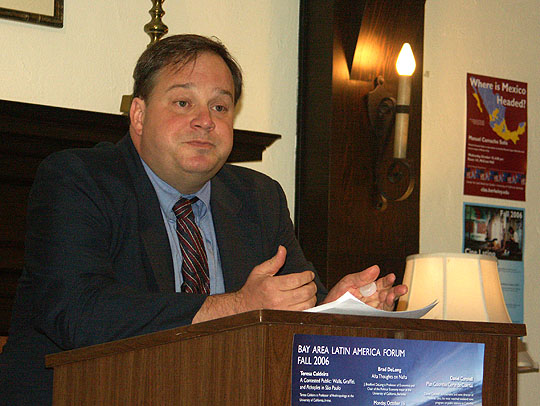BREAKING NEWS: Janet Yellen To Run The World
---
Sadly, this is not a joke. The discussion of possible Bernanke replacements has already begun, and Brad Delong is positively giddy about the prospect of a new and improved Fed Chairman willing to do $6 trillion in monetary stimulus (quantitative easing through the purchase of longer-dated Treasuries) between now and October.
You read me right. These shameless political econo-trolls (Keynesians are more politician than economist as they advocate massive spending as a means to win elections, all notions of fiscal sanity be damned) are more dangerous to your children than any other form of human species. They would gladly sacrifice $6 trillion to keep their party in power.
The seemingly benign task of reading their polluted machinations sends me into near apoplexy. I have no words to express the disgust I have for these creatures, who would suggest we mortgage your children's future via absolute dollar destruction, so that their side might retain a few more House seats in November.
Without words, I will resort to the only thing I have left: raw emotion. Fuck you Brad Delong. You are the most irresponsible, despicable Keynesian econo-troll I have ever come across, including your cousin Krugman. May you and your kind (Keynes) lose power and may you personally get buried under 2,000 pounds of Ding-Dongs inside your Berkeley headquarters. And do not share the processed chocolate delights with your soulmate Christina Romer, as she, like you, has had plenty already.
-----
Super Galactic Queasing
Excerpt:
No Exit: The Case for $6 Trillion More Monetary Stimulus, by Joseph Gagnon, Peterson Institute for International Economics: A lively debate is under way between those who want more fiscal stimulus to create jobs and those who worry that our national debt is already too high. Both sides are ignoring the obvious alternative--one that would create jobs and lower the deficit. In a newly-posted Policy Brief, I present the argument for easier monetary policy in all the main developed economies.
As the latest job figures demonstrate, the economies of the United States, the euro area, Japan, and the United Kingdom are suffering from historically high rates of unemployment. In all four economies, the overwhelming majority of forecasters see weak economic growth and lackluster job creation over the next two to three years. In Washington, the Obama administration has just held a Jobs Summit, underscoring the concern about how to put more Americans back to work. Clearly, we need more macroeconomic stimulus to reduce the suffering and allay the long-term damage caused by persistent unemployment as well as to ward off the risk of harmful deflation. But record peacetime fiscal deficits and rapidly rising public debt point to monetary policy, rather than fiscal policy, as the way to go.
Short-term interest rates already have been reduced to near zero. But the Federal Reserve and its counterparts have other tools to use for monetary stimulus. Over the past year, the Federal Reserve and the Bank of England have pushed down long-term borrowing costs for both the public and private sectors through their large-scale purchases of long-term bonds. There is considerable scope for additional purchases to drive borrowing costs even lower. The European Central Bank and the Bank of Japan should join the Federal Reserve and the Bank of England in combined purchases of an additional $6 trillion in long-term bonds designed to push 10-year bond yields down another 75 basis points.
At a time of concern about fiscal deficits, it is important to note that reducing yields on government debt actually reduces the federal deficit. Reducing yields on private debt will also speed the repair of private sector balance sheets and encourage businesses to invest and expand employment. A more rapid recovery further reduces fiscal deficits by raising revenues.It is time to stop arguing about tradeoffs. Monetary policy can create jobs and reduce the deficit at the same time.
I would prefer a different word than "monetary policy" to describe Joe Gagnon's proposed policy: it affects the economy not by changing the monetary base but rather by changing the riskiness and duration of the asset pool held by the private sector, and thus seems to me to be more banking than monetary policy. But it is a coherent plan based on a coherent, and in my view likely to be accurate, view of the world.
-----
DB Here. Under this plan the Dollar would be destroyed, Euro dysfunction be damned
It's a short term fix (that would boost jobs only in the near term) that is shamelessly political in nature, and is outlandish even by lax, econo-troll standards. Gagnon and Delong would obviously do anything to see their side win, and in a just world, the mere suggestion of this idea really ought to disqualify them from ever being taken seriously again.

